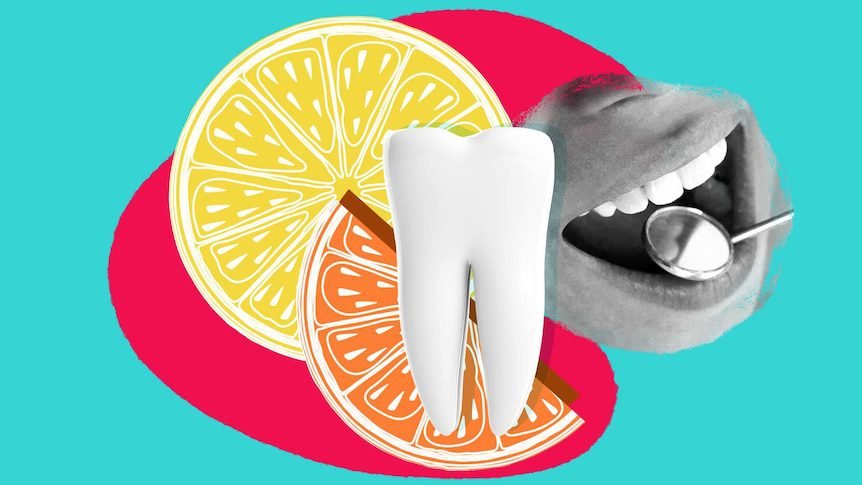Physical Address
304 North Cardinal St.
Dorchester Center, MA 02124
Physical Address
304 North Cardinal St.
Dorchester Center, MA 02124

Eat your fruit instead of drinking it to avoid harming your teeth.

Fruit juice has long been touted as a healthy alternative to sugary sodas and beverages. After all, it’s made from fruit, right? Unfortunately, many people are unaware of the hidden threat that fruit juice can pose to dental health. While fruit juice may seem like a natural choice for hydration, it can actually have detrimental effects on your teeth.
One of the main concerns with fruit juice is its high sugar content. Even though the sugar in fruit juice is naturally occurring, it can still contribute to tooth decay. When we consume sugary foods or drinks, the bacteria in our mouths feed on the sugars and produce acids as a byproduct. These acids then attack the enamel of our teeth, leading to cavities and tooth decay.

Fruit juice is often perceived as a healthy choice, but many people are surprised to learn just how much sugar it contains. In fact, some fruit juices can have just as much sugar as soda. This high sugar content can wreak havoc on dental health, leading to tooth decay and cavities.
According to the American Academy of Pediatric Dentistry, fruit juices can contain as much as 10 teaspoons of sugar per cup. This is concerning because the daily recommended limit for added sugars is 6 teaspoons for children and 9 teaspoons for adults. Consuming excessive amounts of sugar can fuel the growth of harmful bacteria in the mouth, which produce acids that attack tooth enamel. Over time, this can lead to erosion of the enamel and the development of cavities.
It’s important to keep in mind that not all fruit juices are created equal. Some juices may be fortified with added sugars, while others may be made from concentrate, which can have higher sugar content. Additionally, certain juices, such as grape juice or cranberry juice, can be naturally higher in sugar compared to others. It’s crucial to read nutrition labels and choose juices with lower sugar content or opt for whole fruits instead.

Fruit juice is often perceived as a healthy choice, but it’s important to understand the acidic nature of these beverages. Many fruits naturally contain acids, such as citric acid and malic acid, which give them their tangy taste. When fruits are juiced, the concentration of these acids increases, resulting in a more acidic drink.
Acidic beverages can have detrimental effects on our teeth and oral health. The acid in fruit juices can erode the enamel – the protective outer layer of our teeth. Over time, this erosion can lead to tooth sensitivity, cavities, and even tooth decay. The lower the pH level of a beverage, the more acidic it is, and fruit juices often have a low pH level. It’s crucial to be aware of the acidity of fruit juices and take the necessary steps to protect our oral health.
Tooth decay is a common oral health issue that affects individuals of all ages. One of the key factors contributing to tooth decay is the consumption of sugary and acidic foods and beverages. When it comes to tooth decay, sugar and acid play a significant role in the deterioration of tooth enamel.
Sugar, found in various forms in fruit juices, interacts with the bacteria in our mouths to produce acid. This acid, in turn, erodes the enamel of our teeth, leaving them vulnerable to decay. The more frequently and longer the teeth are exposed to sugar and acid, the greater the risk of tooth decay.
Not only does sugar fuel the production of bacteria that cause decay, but the acid content in fruit juices also directly damages tooth enamel. The high acidity levels in some fruit juices can lead to enamel erosion and weakened teeth over time. This erosion can result in tooth sensitivity, increased susceptibility to cavities, and even potential tooth loss if left untreated.
It is important to be aware of the sugar and acid content in fruit juices, as they can have a detrimental effect on dental health. Limiting the consumption of fruit juices, especially between meals, and rinsing the mouth with water after consumption can help reduce the exposure of teeth to these harmful substances. Additionally, maintaining good oral hygiene practices such as brushing twice a day, flossing regularly, and visiting the dentist for routine check-ups can aid in preventing tooth decay caused by sugar and acid.
Fruit juice, while often considered a healthier alternative to soda or other sugary beverages, can actually pose serious risks to dental health. One of the most concerning effects of fruit juice on teeth is its ability to strip away tooth enamel. Enamel is the protective outer layer of the tooth that helps safeguard against tooth decay and sensitivity. However, the acidity of fruit juice can erode this enamel over time, leaving teeth vulnerable to damage and decay.
Research has shown that many fruit juices, even those labeled as “all-natural” or “100% juice,” can have pH levels that are highly acidic. This acidity can weaken the enamel and make teeth more susceptible to erosion. In fact, a study published in the Journal of Dentistry revealed that certain fruit juices can have an erosive potential similar to that of carbonated beverages, which are well-known for their harmful effects on teeth.
Moreover, the high sugar content in fruit juice compounds the problem. Sugar serves as fuel for the bacteria in our mouths, leading to the production of acids that can further erode tooth enamel. The combination of acid and sugar in fruit juice creates an environment that promotes tooth decay and cavities. It is important to note that even unsweetened fruit juice, which naturally contains sugars from the fruit itself, can still have detrimental effects on dental health.
To protect tooth enamel and maintain optimal oral health, it is crucial to limit fruit juice consumption. Moderation is key, particularly for children who are more prone to the damaging effects of acids and sugars on their developing teeth. Opting for whole fruits instead of juice can provide the same nutritional benefits while minimizing the risks to dental health. Additionally, rinsing the mouth with water after consuming fruit juice can help neutralize acidity and reduce the exposure of teeth to harmful substances.
In conclusion, the high acidity and sugar content of fruit juice can strip away tooth enamel, increasing the risk of tooth decay and other dental problems. Limiting fruit juice consumption, especially for children, and practicing good oral hygiene habits are essential steps in maintaining a healthy smile. Stay tuned for more expert recommendations on fruit juice consumption and dental health.
Here is a table that summarizes the impact of fruit juice on dental health:
| Complication | Description |
|---|---|
| Increased risk of cavities | Sugary liquids like fruit juice can increase the risk of cavities by promoting the growth of bacteria in the mouth2 |
| Erosion of tooth enamel | The acid in fruit juice can erode the protective enamel on our teeth, leading to sensitivity, discoloration, and even tooth loss1 |
| Increased risk of gum disease | The sugar in fruit juice can also contribute to the development of gum disease, which can cause inflammation, bleeding, and tooth loss2 |
Fruit juice may seem like a healthy choice, but its impact on dental health should not be overlooked. The link between fruit juice and cavities is of particular concern, especially for children. It is important to understand the reasons behind this connection in order to make informed decisions about juice consumption.
The primary culprits of tooth decay in fruit juice are sugar and acid. Many fruit juices contain high amounts of sugar, which feeds the bacteria in the mouth and contributes to the formation of plaque. Additionally, fruit juices are often acidic in nature, which can erode tooth enamel over time. This combination of sugar and acid creates an environment in the mouth that is conducive to cavities.
Research has shown that even small amounts of fruit juice can have a negative impact on dental health. A study conducted by the American Academy of Pediatrics found that children who consumed more than one serving of fruit juice per day had significantly higher rates of cavities compared to those who did not. Additionally, the study revealed that the risk of cavities increased with the frequency and amount of juice consumed.
To protect dental health, it is important to limit fruit juice consumption, particularly for children. The American Academy of Pediatrics recommends that children aged 1 to 3 years old consume no more than 4 ounces of juice per day, while children aged 4 to 6 should have no more than 6 ounces. For older children and adults, it is best to opt for whole fruits instead of juice, as they provide the same nutrients with less sugar and acid.
In conclusion, the link between fruit juice and cavities is well-established. The sugar and acid content of fruit juice can contribute to tooth decay, especially in children. By limiting juice consumption and opting for whole fruits instead, individuals can protect their dental health and reduce the risk of cavities.
Fruit juice, with its sweet and refreshing taste, has long been a popular choice among both children and adults. However, its impact on gum health is often overlooked. Studies have shown that excessive consumption of fruit juice can contribute to gum disease, also known as periodontitis. The high sugar content in fruit juice provides a favorable environment for harmful bacteria to thrive in the mouth, leading to inflammation and infection of the gums.
Furthermore, the acidic nature of fruit juice can also have detrimental effects on gum health. The acid in fruit juice can erode the protective enamel on the teeth, making them more susceptible to gum disease. When the enamel wears away, it exposes the sensitive dentin layer underneath, causing tooth sensitivity and increasing the risk of gum recession.
It is important to note that while fruit juice can be a part of a healthy diet, moderation is key. Dentists recommend limiting fruit juice consumption and opting for whole fruits instead. Whole fruits provide not only the natural sugars found in juice but also the fiber, which helps to stimulate saliva production and cleanse the mouth. Additionally, regular dental hygiene practices such as brushing, flossing, and regular dental check-ups are crucial in maintaining gum health, regardless of fruit juice consumption.
Fruit juice is a common beverage choice for many people, especially when looking for a refreshing and flavorful option. However, it’s important to understand the potential impact that fruit juice can have on tooth sensitivity.
One of the main contributing factors to tooth sensitivity is the high sugar content found in fruit juice. Sugar provides fuel for the bacteria in our mouths, leading to acid production which erodes the protective layer of enamel on our teeth. Over time, this can result in tooth sensitivity as the dentin, the sensitive layer beneath the enamel, becomes exposed.
But it’s not just the sugar content that can contribute to tooth sensitivity. The acidic nature of fruit juice can be equally damaging. The acids in fruit juice can wear away tooth enamel, increasing the risk of tooth sensitivity. Additionally, the combination of sugar and acid creates a double whammy effect on our teeth, making them more susceptible to sensitivity and decay.
In conclusion, although fruit juice may seem like a healthy choice, it can have a negative impact on tooth sensitivity. The high sugar content and acidic nature of fruit juice can contribute to erosion of tooth enamel and expose the dentin, leading to tooth sensitivity. It is important to be mindful of our fruit juice consumption and consider alternative options that are less damaging to our dental health.
Limiting fruit juice consumption is of utmost importance when it comes to children’s dental health. While fruit juice may seem like a healthy choice, it can actually pose significant risks to their teeth. One main concern is the high sugar content found in many fruit juices. Consuming excessive amounts of sugar can lead to tooth decay and cavities in children, which can have long-lasting consequences on their oral health.
In addition to the sugar content, fruit juice is also highly acidic, which can erode tooth enamel over time. Tooth enamel serves as a protective layer for our teeth, and once it is worn down, it cannot be regenerated. As a result, children who frequently consume fruit juice may be more prone to tooth sensitivity and other dental issues. It is crucial for parents and caregivers to recognize the potential harm that fruit juice can cause and take steps to limit its consumption in children’s diets.
By understanding the negative effects that fruit juice can have on children’s dental health, we can make more informed decisions about their diet and overall well-being. In the following sections, we will delve deeper into the impact of fruit juice on gum health, tooth sensitivity, and explore alternative options for hydration and nutrition. Stay tuned for practical tips on safely incorporating fruit juice into a healthy diet and expert recommendations for promoting optimal dental health in children. Together, we can protect their smiles for a lifetime.
To safely incorporate fruit juice into a healthy diet, it’s essential to understand the recommended guidelines for consumption. The American Academy of Pediatrics advises limiting fruit juice intake to no more than 4 to 6 ounces for children aged 1 to 6 years, and no more than 8 to 12 ounces for older children and adolescents. It’s also crucial to choose 100% fruit juice without added sugars, as this can significantly impact dental health.
Instead of sipping on juice throughout the day, it’s better to have it during mealtimes to minimize the exposure of teeth to sugar and acid. This approach allows for proper saliva production, which helps neutralize acids and rinse away leftover residue. Additionally, using a straw when drinking fruit juice can help reduce contact with teeth, minimizing the risk of damage to enamel. Lastly, always remember to brush your teeth at least twice a day, especially after consuming fruit juice, to remove any lingering sugars and acids and maintain optimal oral health.
When it comes to hydration and nutrition, fruit juice may not be the ideal choice for everyone. Fortunately, there are alternative options that can provide the necessary hydration and nutrients without the potential negative effects on oral health. One such option is water – the ultimate thirst quencher. Water is not only hydrating, but it also has zero calories, zero sugar, and zero acidity, making it a great choice for maintaining a healthy smile.
In addition to water, herbal teas can be a flavorful and nutritious alternative to fruit juice. Many herbal teas are naturally caffeine-free and offer a variety of health benefits. For example, peppermint tea can aid in digestion, chamomile tea can support relaxation, and green tea can provide antioxidants. It’s important to choose herbal teas without added sugars or acidic ingredients to avoid any potential harm to oral health.
Maintaining good dental hygiene is crucial for combating the effects of fruit juice on oral health. Regular brushing and flossing are essential in removing the sugar and acids that can lead to tooth decay and enamel erosion. It is recommended to brush your teeth at least twice a day, using fluoride toothpaste, and to floss once daily to remove any trapped food particles or plaque.
In addition to regular brushing and flossing, it is important to visit the dentist on a routine basis. Regular dental check-ups allow for the timely detection and treatment of any oral health issues, preventing them from worsening or causing further damage. Dentists can also provide professional cleanings to remove stubborn plaque and tartar buildup, which may be more difficult to remove with regular brushing alone.
Furthermore, dentists can provide personalized advice and guidance on proper oral hygiene practices, as well as recommend the use of fluoride mouthwash or dental sealants to help protect teeth from the acids and sugars found in fruit juice. By prioritizing dental hygiene and seeking professional dental care, individuals can effectively combat the negative effects of fruit juice on their oral health.
Fruit juice has long been a staple in many households, but when it comes to dental health, experts recommend limiting consumption. The American Academy of Pediatrics suggests that children under the age of 1 should avoid fruit juice altogether, while older children should consume no more than 4 to 6 ounces per day. This recommendation is based on the high sugar content of fruit juice, which can contribute to tooth decay.
Sugar is the main culprit behind dental cavities, as it provides a food source for the bacteria that live in our mouths. When these bacteria feed on sugar, they produce acids that can erode tooth enamel and lead to cavities. Fruit juice not only contains natural sugars, but it can also have added sugars, further increasing the risk of dental problems. It’s important to note that even 100% fruit juice still contains sugar, as the juicing process removes the fiber that helps slow down the absorption of sugar in whole fruits.
While fruit juice can be a tasty and refreshing treat, it’s important to consume it in moderation and maintain proper oral hygiene practices. Regular brushing and flossing, along with routine dental check-ups, are crucial for preventing tooth decay and maintaining overall dental health. Additionally, parents should encourage their children to drink water or milk instead of fruit juice as a healthier alternative. By following these expert recommendations, individuals can help protect their teeth against the hidden threats of fruit juice.
Yes, fruit juice can be a hidden threat to dental health due to its high sugar and acidic content.
Fruit juice can contain a surprisingly high amount of sugar, sometimes even more than soda. It is important to be aware of the sugar content when consuming fruit juice.
The acidic nature of fruit juice can contribute to tooth decay and erosion of tooth enamel, making it important to limit consumption and practice good oral hygiene.
Fruit juice contains sugar and acid, which can combine to create a breeding ground for bacteria in the mouth, leading to tooth decay and cavities.
Yes, the acid in fruit juice can weaken and strip away tooth enamel over time, making teeth more susceptible to decay and sensitivity.
Yes, consuming fruit juice on a regular basis can increase the risk of developing cavities due to its high sugar and acid content.
Fruit juice can contribute to gum disease and inflammation if consumed in excess. Its high sugar content can promote bacterial growth, leading to gum problems.
Yes, the acid in fruit juice can cause tooth sensitivity by wearing away tooth enamel, exposing the underlying sensitive layers of the tooth.
Children are more susceptible to tooth decay and cavities, and excessive fruit juice consumption can increase their risk. Limiting fruit juice intake helps protect their dental health.
It is recommended to consume fruit juice in moderation, preferably diluted with water, and to drink it with a meal to minimize its impact on dental health.
Yes, alternatives to fruit juice for hydration and nutrition include drinking water, herbal teas, and consuming whole fruits and vegetables.
Practicing good dental hygiene, such as regular brushing, flossing, and visiting the dentist, can help minimize the negative effects of fruit juice on dental health.
Experts recommend limiting fruit juice consumption, diluting it with water if consumed, and practicing good oral hygiene to maintain dental health.